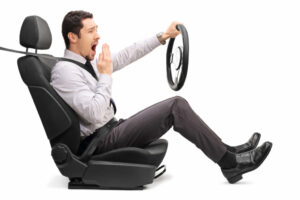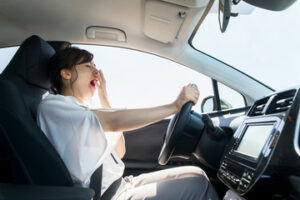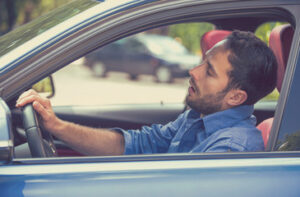Drowsy or Fatigued Driving Accidents

Anyone who has felt their eyelids getting heavy while behind the wheel or been jolted awake by tires drifting onto a highway rumble strip knows what it’s like to drive while fatigued. Drowsy drivers pose a hazard to themselves and others on the road.
The Governors Highway Safety Administration (GHSA) estimates that 328,000 crashes on U.S. roadways each year involve drowsy driving. Of them, 6,400 are fatal, and 109,000 cause injuries. The agency says 10 to 20% of large truck or bus accidents on U.S. roadways involve a drowsy driver.
The danger of driving while drowsy is that your recognition of hazards and ability to react are impaired. The National Sleep Foundation says sleep deprivation leads to mental impairment that is similar to being drunk. There is nothing you can do but stop the car and get some rest or let someone else drive. Quick fixes such as rolling down the window, turning up the radio, or even drinking coffee only help for a few moments. Trying to delay the body’s need for sleep poses a danger.
If you have been injured in a car accident that may have been caused by a drowsy driver, the West Virginia car accident lawyers of Jividen Law Offices, PLLC can help you. An experienced car crash attorney can investigate the accident and pursue full compensation on your behalf if you are facing the cost of significant medical expenses and other losses. Call us now at 304-407-7511 or reach out online for a free initial consultation.
Who’s Most at Risk of Driving While Drowsy?
Everyone gets drowsy and fatigued. Sleep is necessary to restore the body and power the mind, the National Sleep Foundation says.
The Foundation has established guidelines for sleep requirements that say healthy adults need between 7 and 9 hours of sleep per night. Babies, young children, and teens need even more sleep to enable their growth and development. People over 65 should get 7 to 8 hours of sleep per night. 
Going one night without sleep – 24 hours – results in fatigue roughly equal to the effects of a blood alcohol content (BAC) of 0.10%, which is higher than the legal threshold for a DUI charge, according to the Foundation.
A study based on the database at the Highway Safety Research Center at the University of North Carolina examined 4,333 crashes in which the driver was judged to be asleep but not intoxicated. The study reported that 55% of drivers in drowsy driving crashes were 25 years old or younger, with a peak of occurrence at age 20.
A report from the National Institutes of Health (NIH) says teens and younger adults are more likely to fail to get adequate sleep due to social activities, television viewing, and being on the internet. Further, many teens work on the weekends and on weeknights after school. Those who work 20 or more hours per week tend to have a later bedtime and less sleep.
Others likely to be sleepy or fatigued when behind the wheel include:
- Commercial drivers who operate tractor-trailers, buses, and tow trucks. A large study by the Federal Motor Carrier Safety Administration, which regulates commercial motor vehicle drivers, found that 13% of drivers were considered to have been fatigued at the time of their crashes.
- Shift workers who work overnight or alternating day and night shifts
- Drivers on long trips
- New parents, especially if they also work outside of the home
- Drivers who take certain medications or who consume alcohol or certain illicit drugs
- Drivers who have untreated sleep disorders such as sleep apnea, which disrupts sleep.
What Happens When a Drowsy Driver Causes a Crash?
The aforementioned study based on the database at the Highway Safety Research Center at the University of North Carolina also reported that:
- 78% of drowsy driving crashes involved the driver running off the road
- Drowsy driving crashes were often serious because the sleepy driver failed to brake or swerve to avoid a collision
- Most took place at higher speeds (62% in excess of 50 mph)
- Fatigued and drowsy driving crashes were more likely between midnight and 7 a.m. and about 3 p.m.
Drowsy drivers may injure themselves, passengers in their vehicles, pedestrians or cyclists, or drivers and passengers in other vehicles.

When we investigate crashes that have resulted in serious injury, we consider whether speed was a factor, which in turn may indicate a driver who was drowsy, fatigued, or even asleep at the wheel.
Drowsy drivers generally do not admit their fatigue after an accident. The adrenaline rush caused by the crash may disguise their impairment. However, the lack of skid marks plus the serious damage and injury indicate a lack of braking, a hallmark of impairment, like drowsiness.
Other evidence of drowsy driving may be available from the:
- Crashed vehicle’s Event Data Recorder (EDR or “black box”), which records braking, speed, acceleration, steering trajectory, and more just before impact
- Witness statements, which may attest to a lack of slowing or swerving before the crash
- Nearby security cameras, which may have recordings that show the moving vehicle before or during the crash
- Driver’s work or school attendance records, debit or credit card receipts, and/or cellphone and social media activity from the hours before the crash, which may indicate continued activity and therefore lack of sleep.
The evidence our attorneys seek can make clear that the drowsy driver was at fault for the accident. If necessary, we can work with accident reconstruction experts to build a persuasive explanation of how a car accident happened.
Once we have completed our investigation, we will seek to negotiate a proper insurance settlement on your behalf. In cases where the at-fault driver’s insurer will not do the right thing, our attorneys at Jividen Law Offices will be ready to go to court and fight for you
Talk to a Fatigued Driving Accident Lawyer
If you have been injured in a car accident in West Virginia in which it appears the driver did nothing to avoid the accident, you may have been the victim of a drowsy driver. You may have a right to significant compensation.
Contact Jividen Law Offices, PLLC, in Wheeling, WV, by phone or online for a free, no-obligation review of your case with an experienced car accident attorney. Our legal team has the resources and experience to help you pursue maximum compensation for your injuries and losses. Call us or reach out online now.
